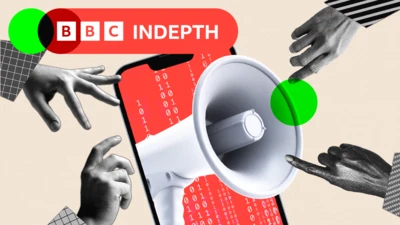We've updated our Privacy and Cookies Policy
We've made some important changes to our Privacy and Cookies Policy and we want you to know what this means for you and your data.
ISS: Spacecraft hole could be 'deliberate'
Image source, NASA
The head of Russia's civilian space agency says the hole in a spacecraft docked at the International Space Station was caused by a drill and could have been "deliberate".
The hole was detected in the Soyuz craft by crew members on Wednesday; they used tape to seal the leak after it caused a minor loss of pressure.
"There were several attempts at drilling," Dmitry Rogozin said.
The drill appeared to have been held by a "wavering hand", he added.
An impact by a small space rock - a micrometeorite - or a small piece of orbital debris has been ruled out.
There are currently six crew members aboard the ISS: three Americans, two Russians and a German.
A commission would seek to identify the culprit by name, Mr Rogozin said. He added that this was a "matter of honour" for Russia's Energiya space manufacturing company that made the Soyuz.
The hole is in a section of the Soyuz ship that will not be used to carry astronauts back to Earth.
This article contains content provided by Twitter. We ask for your permission before anything is loaded, as they may be using cookies and other technologies. You may want to read Twitter and before accepting. To view this content choose 'accept and continue'.
End of Twitter content
Photos of the hole have been circulating on internet sites.
A space industry source told Russia's Tass state news agency that the spacecraft could have been damaged during testing at Baikonur cosmodrome in Kazakhstan.
Then, after passing initial checks, the mistake might have been covered up.
"Someone messed up and then got scared and sealed up the hole," the source speculated, but then the sealant "dried up and fell off" when the Soyuz reached the ISS.
In his televised comments, Mr Rogozin reportedly said: "What is this: a production defect or some premeditated actions?... We are checking the Earth version. But there is another version that we do not rule out: deliberate interference in space."
Top Stories
More to explore
Most read
Content is not available








